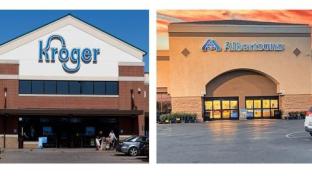Kroger, Albertsons Ready to Go to the Mat, Says Analyst
There’s much to speculate about regarding the future of the proposed merger between The Kroger Co. and Albertsons Cos., as well as the possible divestiture of 413 stores and other assets to C&S Wholesale Grocers. The $24.6 billion deal was thrown into question last week as the Federal Trade Commission (FTC) officially filed a lawsuit to halt the mega-merger because it would “eliminate fierce competition” in the industry.
New research from S&P Global Ratings is highlighting the credit implications of the FTC’s move for all three food retailers involved, and Pablo Garces, retail director and primary credit analyst for S&P, spoke to Progressive Grocer about how he sees things further unfolding.
According to Garces, S&P expected that the FTC would make a move against the merger, especially considering the vocal opposition to it from myriad organizations. Kroger and Albertsons also seemed to be ready for the legal action, having told Bloomberg in May 2023 that the two companies agreed in advance to commit to litigation.
The Benefits and Challenges
Digging into the research, S&P found that Kroger stands to benefit if the merger is merely delayed, since it could ultimately reduce its financing package. If the merger does not go through, Kroger would still hold its place as a leading grocer, but will continue to face familiar competitive threats from both grocers and e-commerce players.
[RELATED: Stopping Mergers Won’t Save Grocery Stores]
As for Albertsons, a merger will likely lead to a multiple-notch credit upgrade for the grocer, while it will likely consider alternate paths to maximize shareholder returns without a merger. Garces believes Albertsons is in a better position than it was two years ago when it entered into a strategic review, and the merger going by the wayside would not necessarily hurt its future success.
“While potential avenues in February 2022 related to re-leveraging the business; selling a division; or monetizing its owned real estate, which we understand today to be worth over $13 billion, Albertsons may stand pat on wholesale capital structure changes if the merger does not go through,” the research stated. “It is also worth noting that the financial sponsors that held approximately 70% of Albertsons shares in October 2022 have reduced their ownership.”
For its part, C&S’s expanded presence in retail grocery understandably hinges on the merger going through, especially as Kroger could require it to purchase up to an additional 237 stores in order to gain FTC approval. That would be in addition to the 413 stores, eight distribution centers and two offices it has already agreed to acquire.
“Without the acquisition, C&S will likely remain a near pureplay wholesale grocery distributor for the foreseeable future,” the research found. “An opportunity like the proposed divestiture package is unlikely to present itself again anytime soon.”
The Possible Future
If the lawsuit does end in a failed merger, though, Garces does believe both Kroger and Albertsons would move to turn back on capital expenditures and internal investments, considering the retailers are currently in a holding pattern as they await legal action. In that case, Kroger would likely lean into its alternative profit centers, including retail media, automation and further leveraging of first-party data.
Since the FTC’s lawsuit was somewhat expected, though, Garces shared that Kroger and Albertsons are likely to work with the government agency to beef up its number of divested stores, either through negotiation or through the courts. As far as their positioning, both grocers are well-capitalized to see the lawsuit through, even if it does take several steps including a preliminary injunction, an actual trial or a possible appeal.
“Certainly at this point it seems like they’re ready and willing to go to the mat,” Garces mused.
Nearly half a million associates of Cincinnati-based Kroger serve more than 11 million customers daily through a digital shopping experience and retail food stores under a variety of banner names. The company is No. 4 on The PG 100, Progressive Grocer’s 2023 list of the top food and consumables retailers in North America. Boise, Idaho based Albertsons operates 2,200-plus retail food and drug stores with 1,726 pharmacies, 401 associated fuel centers, 22 dedicated distribution centers and 19 manufacturing facilities. It's No. 9 on The PG 100. Keene, N.H.-based C&S services customers of all sizes, supplying more than 7,500 independent supermarkets, chain stores, military bases and institutions with 100,000-plus products, in addition to operating corporate stores. The company is No. 17 on The PG 100.







